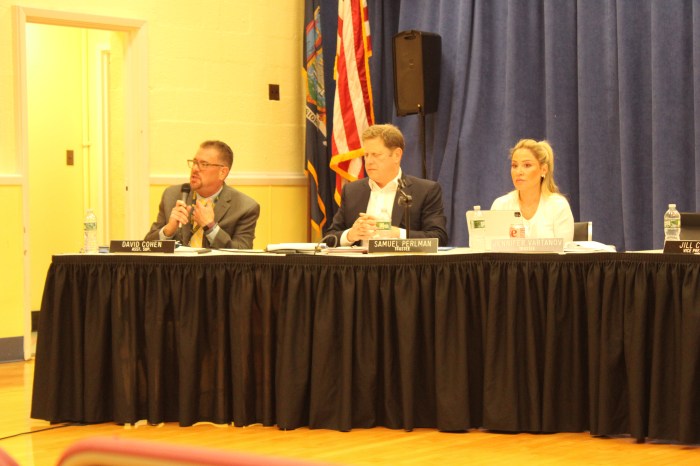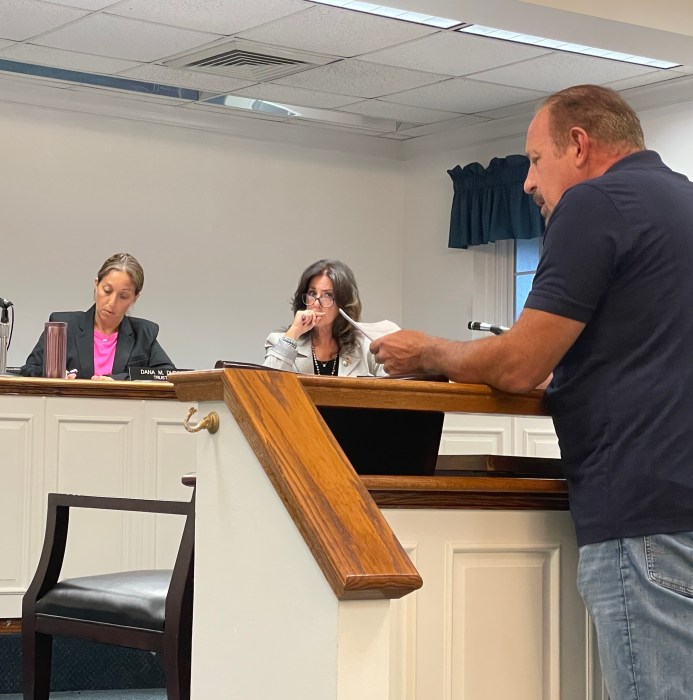Local leaders visit Congressman Israel
with proposal
Several local leaders are discussing the possibility of teaming up to expand Nassau County’s sewer system to improve Hempstead Harbor’s water quality and stimulate economic health and home values.
A group including Nassau County Legislator Delia DeRiggi-Whitton, Sea Cliff Mayor Bruce Kennedy and Hempstead Harbor Protection Committee Executive Director Eric Swenson visited with U.S. Congressman Steve Israel last week.
DeRiggi-Whitton told the Enterprise-Pilot that since she took office she has been searching for a way to get Crescent Beach re-opened. “Summer after summer, the beach stays closed and we know the problem,” she said. “Nassau County Department of Health officials have told me that a few bad cesspools have been contaminating the water. They said the solution is to retire the cesspools and add the homes to our county sewer system.”
DeRiggi-Whitton said she hired a mainly volunteer group of specialists, who put together a proposal that not only would remedy Crescent Beach, but would begin a large-scale improvement to the entire Hempstead Harbor watershed area. This proposal includes various key sites where the use of cesspools has reached its maximum point. For instance, in the Village of Sea Cliff, Sea Cliff Avenue would benefit from connecting to the county sewer system. There is no room for new cesspools, which is difficult for homeowners and could hamper business development, DeRiggi-Whitton said.
Kennedy had previously established a plan to address the issues in his village, on Sea Cliff and Prospect Avenues. DeRiggi-Whitton’s proposal incorporates the fact that Sea Cliff is so far along with designs and studies for connecting to the county sewer.
Other areas that could be connected have similarly strategic advantages, such as a business area near Locust Valley’s “Birches,” where Nassau recently connected the sewer.
“All of the areas we are talking about,” DeRiggi-Whitton said, are close to the water. There is a tremendous amount of waste being filtered by a small stretch of soil and then finding its way into the harbor. It is preferable to send all this waste through the county sewer system, to the county’s treatment plant located in Glen Cove. When it comes out of there it is clean water as opposed to hazardous waste.”
Part of the thinking behind DeRiggi-Whitton’s proposal is that the Nassau County treatment plant in Glen Cove is at a very low capacity right now and can easily take on more waste.
Another key element of the
plan, she said, is for people to remember that proper zoning can be used to dictate how communities develop. “Just because sewers are put in, she said, “Doesn’t mean more development will happen automatically.”
In the year that the Legislator has sought means to fund the sewer expansion through state or federal programs, she said her most receptive official has consistently been Israel. He passed the Long Island Sound Stewardship Act and reauthorized the Long Island Sound Restoration Act.
Israel invited everyone in to hear the proposal and is now setting up a meeting with various leaders and departments to explore ways to help the project move forward.
Swenson is working with DeRiggi-Whitton on the proposal. He attended the meeting with Israel.
Swenson said, “After listening to our needs, Congressman Israel quickly not only identified all of the key players that we need to bring on board but offered to facilitate getting them all together to help make this happen. His instincts were excellent and appreciated by us all.”
Further explaining the need for this kind of project, Swenson added, “Failing onsite cesspools and septic systems can cause significant problems with our harbors and bays and an opportunity
exists to solve problems in three north shore communities. With Legislator DeRiggi-Whitton’s leadership and Congressman Israel’s efforts, we are hopeful that we can help resolve this decades-old problem.”

































